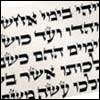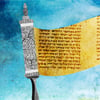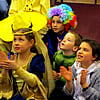JERUSALEM—When Rabbi Yisroel and Shoshana (“Shoshi”) Goldberg first arrived in the upscale Jerusalem neighborhood of Rechavia six years ago, they operated out of synagogues and held classes in private homes whose owners were only too happy to welcome them. But being without a physical center did not stop the couple from taking to the streets and starting what has turned into their own special brand of public Purim celebration, to which they gave the moniker “Azza Zaza.”
Today, their Chabad House at the historic windmill on Ramban Street is thriving, and its public Purim activities take place not only on Azza Street—the neighborhood’s main street for shopping and dining—but have expanded to some of the city’s other major thoroughfares as well. This year it will be also a major presence in the Purim celebrations in the adjacent neighborhood of Nachlaot.
Rechavia and Nachlaot being home to Jews from every background and level of Torah observance, the Goldbergs knew that not everyone would be running to a synagogue on Purim. So they decided to bring the holiday out into the streets, the restaurants, the bakeries—to anywhere and everywhere so, they say, no Jew would be left behind in the mitzvah of listening to the readings of Megillat Esther, one of the four required mitzvahs of Purim.
According to Shoshi Goldberg, the community’s anticipation of the multifaceted celebration each year is palpable.
“When we decided that we wanted to take ‘Azza Zaza’ out to the people, when we thought about how to bring people the spirit of Purim, as well as the opportunity to fulfill mitzvot, we looked at Azza Street,” she says. “It’s full of restaurants, stores, markets, bakeries and a streaming cross section of the population.”
She notes that many of the restaurants were wary of diners potentially being bothered by a religious ceremony, “but knowing how sensitive Chabad is too all Jews, the businesses were willing to cooperate.”

It’s a mitzvah to hear a reading of the Megillah twice on Purim—once in the evening at the onset of the holiday and once the next day. Purim begins in almost all the world on Wednesday night, March 23, and concludes in the evening of Thursday, March 24, but in Jerusalem it’s celebrated a day later on Shushan Purim (the day that certain ancient walled cities celebrate the holiday.)
So starting on Thursday night, March 24, there will be back-to-back Megillah readings at Chabad of Rechavia until midnight, and then hourly public readings throughout the next day, up to the approach of Shabbat.

Jerusalemites aren’t the only ones taking advantage of the readings, notes Rabbi Yisroel Goldberg. Thousands of tourists from overseas are in town for the holiday, and thousands of Israelis flock to Jerusalem after they have celebrated Purim the day before so they can also celebrate on Shushan Purim. “They know where ‘it’s happening’—right here in Rechavia,” says Goldberg.
The number of participants in “Azza Zaza” Purim grows annually; the Goldbergs expect it to surpass the estimated 2,500 people last year to 3,000 or more this year.

In addition to the Megillah readings, the other mitzvahs of Purim are undertaken with the same gusto. Mishloach manot (gifts of food) are given to friends and neighbors, and gifts to the poor are also given.
And then, of course, is the special feast, the seudat Purim. “Last year, we had 70 members of the community come to Chabad for a communal feast,” says Shoshi Goldberg.
Volunteers in Droves
At the core of “Azza Zaza” is the small army of volunteers who work to ensure that every child and adult will have a joyous holiday. Children’s activities are included in the program.
Chaim Kaplan, 28, is the “go to” man for coordinating the team of young men who have taken upon themselves the mission to perform the Megillah readings.
“Last year, our first here with Chabad of Rechavia, my wife wanted to go hear the Megillah reading at a restaurant called From Gaza to Berlin [a word play on the Hebrew word ‘azza’; in English, it is pronounced ‘Gaza’]. She decided that she would go 15 to 20 minutes earlier to get a seat. She came home shocked by the fact that by the time she got there, the restaurant was filled to overflowing, and there were at least 250 people who jockeyed for space on the steps, the sidewalk, all the way to the curbside.

“This event has even touched those so-called ‘hardcore’ people who don’t like to hear about religion at all,” continues Kaplan. “At one location, prior to my reading, an older man approached me and chastised me for broadcasting religion in the streets and imposing my views upon the general public. But after the reading? This same man again approached me and told me how amazed he was—not only by the response of the people themselves, but by the tact and happiness which Chabad had demonstrated.”
“I have to say that ‘Azza Zaza’ has been one of the most moving things I have witnessed in the unifying of all Am Yisrael [the people of Israel],” says Kaplan. “Come to Rechavia and celebrate with us! And if you aren’t going to be nearby, then make sure you listen to the Megillah, give mishloach manot and give charity so that the less fortunate can also feast on Purim.
“Feel the joy, spread the joy, be the joy of Purim!”











Start a Discussion